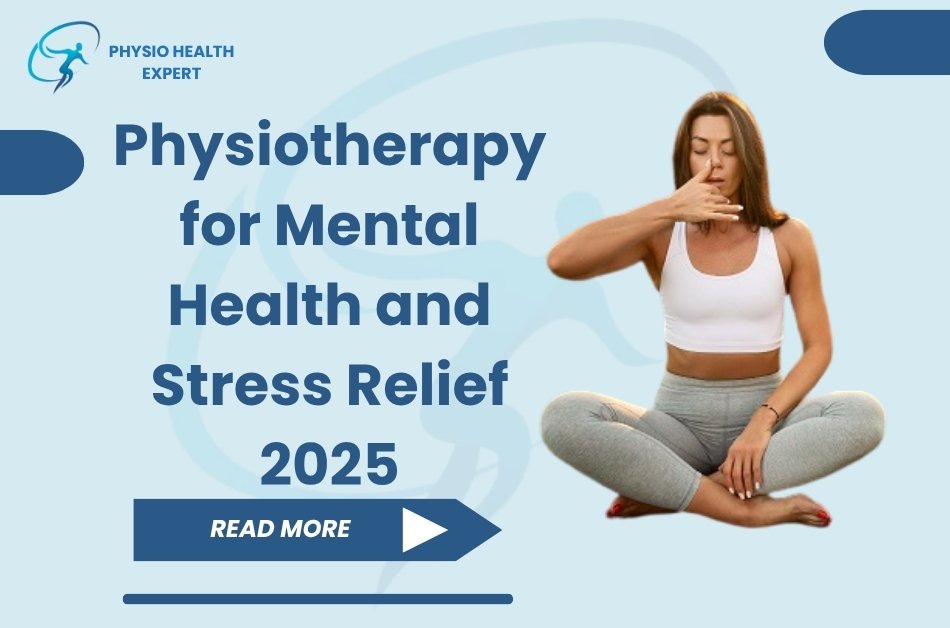Physiotherapy for Mental Health is emerging as a powerful tool for mental health and stress relief, going far beyond physical recovery. From pain management and improved mobility to boosting self-esteem and reducing anxiety, physiotherapists play a vital role in holistic well-being. Techniques such as exercise therapy, manual release, relaxation, and mindfulness not only ease symptoms of stress and depression but also enhance energy, sleep, and quality of life. Explore how Physiotherapy for Mental Health bridges the mind-body connection to support emotional balance and long-term wellness

Mental health involves a balanced, healthy state of mind, in which individuals can confront life’s challenges, recognize and utilize their abilities effectively, learn and work productively, and engage positively with their community. It holds both inherent worth and practical importance, making it a vital component of overall well-being. Mental health encompasses our emotional, psychological, and social well-being. Here we are going to discuss how Physiotherapy for Mental Health and Stress Relief 2025 play a role in your lives.
Emerging Role of Physiotherapy for Mental Health
As awareness of mental health challenges continues to grow globally, healthcare is shifting toward more integrative, body-mind approaches. Traditionally seen as a discipline focused solely on physical rehabilitation, physiotherapy is now expanding its scope to address the psychological dimensions of health. Increasing evidence suggests that movement, body awareness, and physical therapy techniques can have a profound impact on mental well-being. This evolving perspective places physiotherapists in a unique position not just as musculoskeletal experts, but also as key players in the prevention and management of stress, anxiety, and mood-related disorders.
Physiotherapists are using their expertise in movement, exercise, and body-based interventions to help individuals manage stress, anxiety, depression, and other psychological challenges. Their approach acknowledges the mind-body connection, recognizing that mental health conditions often present with physical symptoms such as muscle tension, fatigue, and pain. At the same time, improving physical function and well-being can have a powerful, positive effect on mental and emotional health.

Physiotherapists working in mental health settings for Physiotherapy for Mental Health make a unique contribution by promoting behavioral change, physical activity, and relaxation techniques, all of which support mental well-being. As noted by Alvarez et al. (2022), physiotherapists often work with individuals managing chronic conditions, where psychological support is essential, and they can act as catalysts for behavioral change that improves both physical and mental outcomes.
The shift toward integrated, patient-centered care highlights the valuable and evolving role of physiotherapists in promoting mental health, stress relief, and overall quality of life, making this an important and rapidly growing niche in healthcare.
How can a Physiotherapist help in maintaining and improving Mental Health?

1. Pain Management
Reduce chronic pain, which often contributes to depression and anxiety.
2. Promoting Physical Activity
Encourage movement and exercise, which releases endorphins and reduces stress. Tailor fitness plans to individual needs, promoting self-efficacy.
3. Enhancing Self-Esteem and Body Image
Help patients recover physical function, improving confidence and comfort in their bodies.
4. Rehabilitation Support for Mental Health Disorders
Assist patients with mental illnesses (e.g., schizophrenia, bipolar disorder) in improving physical health and aiding independence.
5. Providing Structure and Routine
Offer consistent therapy sessions that create stability and routine, beneficial for mental well-being.
6. Encouraging Social Interaction
Foster therapeutic relationships that combat isolation and loneliness.
7. Stress Reduction Techniques
Utilize relaxation techniques, breathing exercises, and posture correction to alleviate tension and promote a sense of calm.
8. Empowerment and Goal Setting
Help patients set and achieve goals, reinforcing a sense of purpose and accomplishment. Understanding Stress and Its Relationship with Physical Well-being
Symptoms of Stress
- Body Aches
- Chest pain or Palpitations
- Fatigability
- Insomnia or sleep disturbance
- Headache
- Depression or Anxiety
- Irritability
- Panic attacks
- Sadness
- Raised Blood pressure
- Tense muscles
- Indigestion or Heartburn
- Weak immunity
Physical Effects of Stress: The Psychosomatic Relationship
The psychosomatic connection refers to the interplay between psychological states and physical symptoms. Emotional stress triggers genuine physiological responses, such as increased muscle tone, restricted breathing, and heightened nervous system activity, particularly through the autonomic nervous system. When the body remains in a sympathetic (fight-or-flight) state, muscles often tighten unconsciously in areas such as the neck, jaw, shoulders, lower back, and pelvic floor. If unaddressed, this physical tension can evolve into chronic pain and postural imbalances, further aggravating emotional distress.
According to the sensorimotor simulation hypothesis, emotional induction —whether positive or negative —can lead to increased muscle activity, particularly in the shoulder and lower back regions. Emotional stress has been shown to affect these areas, resulting in heightened muscle tension that may contribute to physical symptoms of stress (Scheer, Kubowitsch, Dendorfer, & Jansen, 2021). Muscle tension is a typical, measurable somatic response to stress.
When stress is prolonged or repressed, its physical effects can become structural, manifesting as a limited range of motion, pain syndromes, and dysfunctional breathing patterns. It has been found in numerous randomized controlled trials that structured exercise programs, including aerobic, resistance, and yoga-based routines, can lead to moderate to significant improvements in symptoms of depression and anxiety, particularly when integrated with mindfulness or awareness-based approaches (Singh et al., 2025).
Physiotherapy Techniques for Improving Mental Health
There are alot of techcniques for Physiotherapy for Mental Health in the field of physiotherapy. Some of them are as follow,
- Exercise Therapy
- Breathing Techniques
- Relaxation Techniques (Progressive Muscle Relaxation – PMR)
- Manual Therapy, including Soft Tissue Massage, Joint Mobilization, and Spinal Manipulation
- Postural Correction and Body Alignment, including Spinal Adjustments
- Mindfulness-Based Movement (Mindfulness-Based Stress Reduction – MBSR)

Physiological Benefits of Physiotherapy Techniques for Mental Health
Physiotherapy techniques contribute to mental health by inducing various physiological changes that promote relaxation, emotional balance, and stress relief. These benefits arise through mechanisms such as neurotransmitter regulation, hormonal balance, and improvements in nervous system function.
- Neurotransmitter Regulation: Exercise therapy enhances the release of endorphins, serotonin, dopamine, and norepinephrine, which are critical for mood elevation, anxiety reduction, and emotional stability. This helps alleviate symptoms of depression, increase alertness, and promote a general sense of well-being.
- Neuroplasticity and Brain Function: Regular physical activity and mindfulness-based movement improve brain structure by increasing hippocampal volume and stimulating neurogenesis. This enhances memory, focus, decision-making, and emotional regulation.
- Cortisol Reduction: Techniques such as exercise, manual therapy, breathing exercises, and relaxation techniques can help decrease cortisol levels, which is the primary stress hormone. This results in reduced chronic stress, better resilience, and a calmer mental state.
- Autonomic Nervous System Regulation: Breathing techniques and PMR cause activation of the parasympathetic nervous system, leading to a slowed heart rate, lowered blood pressure, and a state of relaxation. This counteracts the body’s stress response and improves emotional stability.
- Improved Circulation: Manual therapy and spinal adjustments enhance blood flow and oxygen supply to tissues, boosting energy levels and promoting physical comfort, which in turn positively affects mental well-being.
- Sleep Enhancement: Exercise and relaxation techniques improve sleep quality, including faster sleep initiation and more profound, more restorative sleep, which is essential for mental health recovery.
- Endorphin Release: Spinal adjustments and physical activity trigger the release of endorphins, which helps naturally elevate mood and reduce anxiety.
- Immune System Function: Controlled breathing and relaxation help improve immune function, indirectly supporting mental health by reducing stress associated with illness.
- Collectively, these physiological effects create a strong foundation for improved mental health, reduced anxiety and depression, and enhanced quality of life.

Evidence-Based Role of Physiotherapy for Mental Health
A growing body of evidence supports the role of physiotherapy in enhancing mental health. Clinical trials and systematic reviews have shown that physiotherapy interventions such as exercise therapy, manual therapy, and relaxation techniques can significantly reduce symptoms of anxiety, depression, and stress. These interventions promote neurochemical balance, lower stress hormone levels, and enhance overall quality of life, making physiotherapy a practical and evidence-based approach to supporting mental well-being.
Research has increasingly validated the role of breathing techniques in physiotherapy for managing stress and anxiety, with recent studies offering more straightforward guidelines for their effective implementation. A notable publication titled “Breathing Practices for Stress and Anxiety Reduction: Conceptual Framework of Implementation Guidelines Based on a Systematic Review of the Published Literature” has provided an evidence-based framework for optimizing the use of breathing practices across diverse populations.
While it has been well established that controlled breathing promotes relaxation, this systematic review clarified which factors truly influence its effectiveness. The study identified five key components that enhance the stress-reducing benefits of breathing techniques: avoiding short (<5-minute) or fast-only breathing sessions; ensuring multiple sessions to promote long-term practice; and integrating human-guided training during the first few sessions. These findings support the clinical integration of breathing techniques by physiotherapists, reinforcing their role in mental health care. By following this research-backed framework, physiotherapists can effectively implement breathing interventions to help patients reduce stress, manage anxiety, and improve overall emotional well-being as part of a holistic, evidence-based approach to care (Bentley et al., 2023).
Research has shown that manual therapy has positive effects on psychological well-being. It helps reduce anxiety and depression by promoting relaxation, easing muscle tension, and lowering stress hormones like cortisol. These calming effects support better emotional regulation and mental clarity. Additionally, manual therapy enhances quality of life (QOL) by improving physical comfort, reducing mental fatigue, and fostering an overall sense of well-being (Taşkaya, Taşkent, Çakıllı, & Yılmaz, 2024).
In 1979, Dr. Jon Kabat-Zinn created the Mindfulness-Based Stress Reduction (MBSR) program, initially intended for stress management. Since then, it has broadened in scope to support the treatment of various health conditions, such as anxiety, depression, skin disorders, chronic pain, immune-related illnesses, hypertension, and diabetes. By utilizing mindfulness meditation, MBSR helps reduce the suffering associated with physical, psychosomatic, and psychological disorders (Niazi & Niazi, 2011).
Physiotherapy for Mental Health does the production of endorphins, neurotransmitters associated with an elevated mood and a sense of well-being. Its long-term impact on mental health is well-established, with extensive research demonstrating that regular physical activity can alleviate symptoms of depression and enhance overall emotional health. A meta-analysis of 49 studies revealed that exercise has a moderate to strong effect in reducing depressive symptoms. One key mechanism behind this mood improvement is the increased release of neurotransmitters, including serotonin, dopamine, and norepinephrine. These brain chemicals play a crucial role in regulating mood, and their elevated levels through exercise contribute to greater enjoyment, pleasure, and a heightened sense of well-being (Hossain, Lee, Choi, Kwak, & Kim, 2024).
Summary
Physiotherapy for Mental Health is emerging as a powerful tool in promoting mental health and stress relief, moving beyond physical recovery to address the mind-body connection. Research shows that techniques like exercise therapy, manual therapy, breathing practices, and mindfulness-based movement not only reduce pain but also improve mood, lower stress hormones, enhance sleep, boost self-esteem, and support mental health rehabilitation. Physiotherapy for Mental Health help manage stress-related symptoms such as muscle tension, fatigue, and anxiety by fostering relaxation, physical activity, and behavioral change. Backed by growing evidence, physiotherapy is proving to be an effective, evidence-based, and holistic approach for enhancing both physical and psychological well-being.
